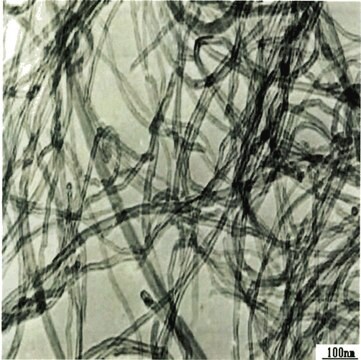901056
Carbon nanotube sheet
aligned, size × thickness 50 mm × 50 mm × 1-5 μm
Synonym(s):
MWCNT, MWNT, Multiwall carbon nanotube
About This Item
Recommended Products
Quality Level
assay
>95% (carbon)
resistivity
10-1000 Ω/sq
size × thickness
50 mm × 50 mm × 1-5 μm
diameter
10-40 nm (carbon nanotubes)
SMILES string
[C]
InChI
1S/C
Looking for similar products? Visit Product Comparison Guide
General description
CNT has a multi-walled structure. Crystal quality of CNT is examined by Raman scattering measurement. Intensity ratio of G-peak (1580 cm-1) and D-peak (1350 cm-1) represents quality of graphitization of carbon materials. G/D of CNT is ~3, showing high crystal quality. The high crystallinity is supported by transmission electron microscopy.
Preparation Note
Storage Class
11 - Combustible Solids
wgk_germany
WGK 3
flash_point_f
Not applicable
flash_point_c
Not applicable
Choose from one of the most recent versions:
Certificates of Analysis (COA)
Don't see the Right Version?
If you require a particular version, you can look up a specific certificate by the Lot or Batch number.
Already Own This Product?
Find documentation for the products that you have recently purchased in the Document Library.
Articles
A drawable Carbon Nanotube (CNT) array is a special type of CNT forest, in which individual nanotubes are aligned and grown vertically on a substrate through a chemical vapor deposition (CVD) process. Most strikingly, a macroscopically aligned, pure, and pristine CNT sheet can be continuously drawn out of the array, parallel to the drawing direction, as a result of a delicate interactive force established between neighboring CNTs. Carbon nanotube array has opened the door to practical applications of carbon nanotubes and multifunctional CNT composites, enabling exciting future innovations
Professor Rivnay (Northwestern University, USA) discusses using organic mixed conductors as an alternative to efficiently bridge the ionic world of biology with contemporary microelectronics.
Synthesis and Applications of Graphene Nanoribbons Synthesized
Our team of scientists has experience in all areas of research including Life Science, Material Science, Chemical Synthesis, Chromatography, Analytical and many others.
Contact Technical Service



